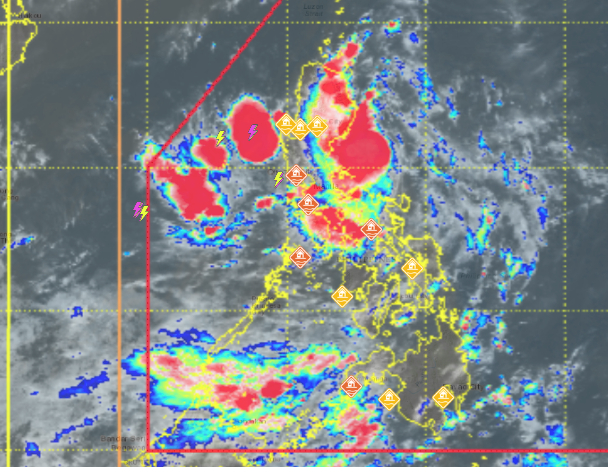Lacson files bill strengthening Human Security Act
Senator Panfilo Lacson has filed a bill seeking to enhance the decade-old Human Security Act and give the country's fight against terrorism a much-needed boost.
Lacson said Senate Bill 1956 or the proposed "Anti-Terrorism Act of 2018" filed Wednesday has provisions on foreign terrorists and additional predicate crimes.
He said the Human Security Act of 2007 or Republic Act 9372 has been in effect for more than 10 years but gaps in the law prevented authorities from implementing it properly.
Lacson said the occupation of Marawi City by the Maute group in 2017 "revealed the many loopholes of the current anti-terrorism law.”
Further, he said the recent bombing incident in Isulan, Sultan Kudarat suggests that neither martial law nor the Bangsamoro Organic Law could guarantee peace in Mindanao.
"While an anti-terror law in itself cannot solve the problem of terrorism, an intensified one can however give the government and the law enforcement agencies the much-needed tool in dealing with the emerging threats of terrorism,” he said.
Under the bill, the term "terrorist acts" instead of “terrorism" is used to remove the requirement of the acts being perpetrated for the purpose of coercing the government to give in to a specific demand.

Need a wellness break? Sign up for The Boost!
Stay up-to-date with the latest health and wellness reads.
Please enter a valid email address
Your email is safe with us
"This has the effect of punishing the act of committing crimes that sow widespread extraordinary fear and panic, and not the purpose behind the commission of such acts," said Lacson, a former chief of the national police.
He said the bill also penalizes foreign terrorists, including those who travel to a state other than their state of residence for committing or organizing terrorist acts; and those residing abroad who come to the Philippines in transit to commit or take part in terrorist acts to target countries.
He said the bill makes it clear that terrorist acts shall exclude legitimate exercises of the freedom of expression and right to peaceably assemble "where a person does not have the intention to use or urge the use of force or violence or cause harm to others."
The bill also adds three predicate crimes to the 12 in the present law. These are:
- RA 9208, Anti-Trafficking in Persons Act of 2003
- RA 9165, Comprehensive Dangerous Drugs Act of 2002
- RA 10175, Cybercrime Prevention Act of 2012
He said also covered are other analogous acts that tend to cause death or serious bodily injury, or intend to cause risk to the health, safety or security of the public, or intend to seriously interfere with, disrupt or destroy critical infrastructure.
Also covered are acts using weapons of mass destruction, proscribed under relevant treaties and conventions where the Philippines is a state party.
Lacson said the bill punishes those recruiting another person to serve in or with an armed force in a foreign state; publishing an ad or propaganda; and other acts with the intention of facilitating or promoting the recruitment of persons to serve in any capacity in or with such armed forces.
It also penalizes the crime of conspiracy to commit terrorist acts, proposal to commit terrorist acts, and inciting to commit terrorist acts - which are punishable by life imprisonment without parole.
Under the bill, accomplices to terrorist acts may face imprisonment of 17 to 20 years, while accessories face imprisonment of 10 to 12 years.
Lacson said public officers found guilty of terrorist acts face perpetual disqualification from holding public office and forfeiture of their retirement benefits.
Surveillance
The bill states law enforcement or military personnel may conduct surveillance on suspected terrorists upon written authorization by the Anti-Terrorism Commission, and upon granting of a judicial authorization by the Court of Appeals and the regional trial court that has territorial jurisdiction over the area where the suspected persons are located.
The judicial authorization shall be good for up to 90 days. Surveillance conducted without a judicial authorization may mean imprisonment of 10 to 12 years.
Under the bill, if no case is filed after the judicial authorization lapses, the law enforcement or military official shall inform the subject of the surveillance. Failure to do so may mean imprisonment of 10 to 12 years.
In case of an actual or reasonable belief of imminent terrorist attack, the ATC may file an ex-parte application before the CA or RTC to instruct the Department of Information and Communications Technology to compel telecom and internet service providers to produce all customer information and call and text data records of any person suspected of terrorist attacks.
The bill also states that access to any information gathered through surveillance shall be limited to the applicants, duly authorized ATC personnel, hearing justices or judge, clerk of court, and duly authorized personnel of the hearing or issuing court.
Law enforcement or military officers or any custodian who destroys the recordings, notes or memoranda face imprisonment of six to 12 years.
Unauthorized revelation of classified materials will be punishable by imprisonment of six months to six years.
Meanwhile, the bill allows the detention of a suspect for up to 30 days even without a valid arrest warrant, provided that the detention is a result of the surveillance defined in the bill.
However, false prosecution may be punishable by damages of up to P50,000. Furnishing false or spurious evidence is punishable by imprisonment of 12 to 20 years.
The bill states the Anti-Terror Council is transformed into the Anti-Terrorism Commission, an agency attached to the Office of the President for policy coordination.
ATC
The ATC shall be headed by the Executive Secretary as chairperson, and have four commissioners appointed by the President, with the rank of undersecretary.
The ATC has the power to:
- Monitor the progress of investigation and prosecution of all persons accused and/or detained for terrorist crimes;
- Enlist the assistance of and file appropriate action with the Anti-Money Laundering Council to freeze the funds and other assets of those suspected of terrorist acts;
- Coordinate with other states, jurisdictions, international entities and organizations in preventing and combating international terrorism; and
- Act on relevant resolutions from the United Nations Security Council, and on foreign requests
Under the bill, the ATC shall also lead the formulation and implementation of a strategic plan to prevent and combat terrorism, enlisting the assistance of government agencies and non-government organizations.
It shall investigate motu propio or upon complaint any report of abuse, malicious application or improper implementation of the provisions of the bill.
In the interim, the National Intelligence Coordinating Agency shall serve as the ATC's secretariat.
The Commission on Human Rights shall give the highest priority to the investigation and prosecution of violations of civil and political rights of persons in relation to the implementation of this Act.
The bill also requires the Department of Education, Commission on Higher Education and Technical Education and Skills Development Authority to promulgate rules promoting peace and inclusivity in schools.
"Any school, learning center and training institutions found to be promoting or encouraging acts of violence, extremism, terrorist acts or any act prohibited by this bill shall have its license revoked and shall immediately cease operation," Lacson said. — Amita Legaspi/RSJ, GMA News

Need a wellness break? Sign up for The Boost!
Stay up-to-date with the latest health and wellness reads.
Please enter a valid email address
Your email is safe with us









